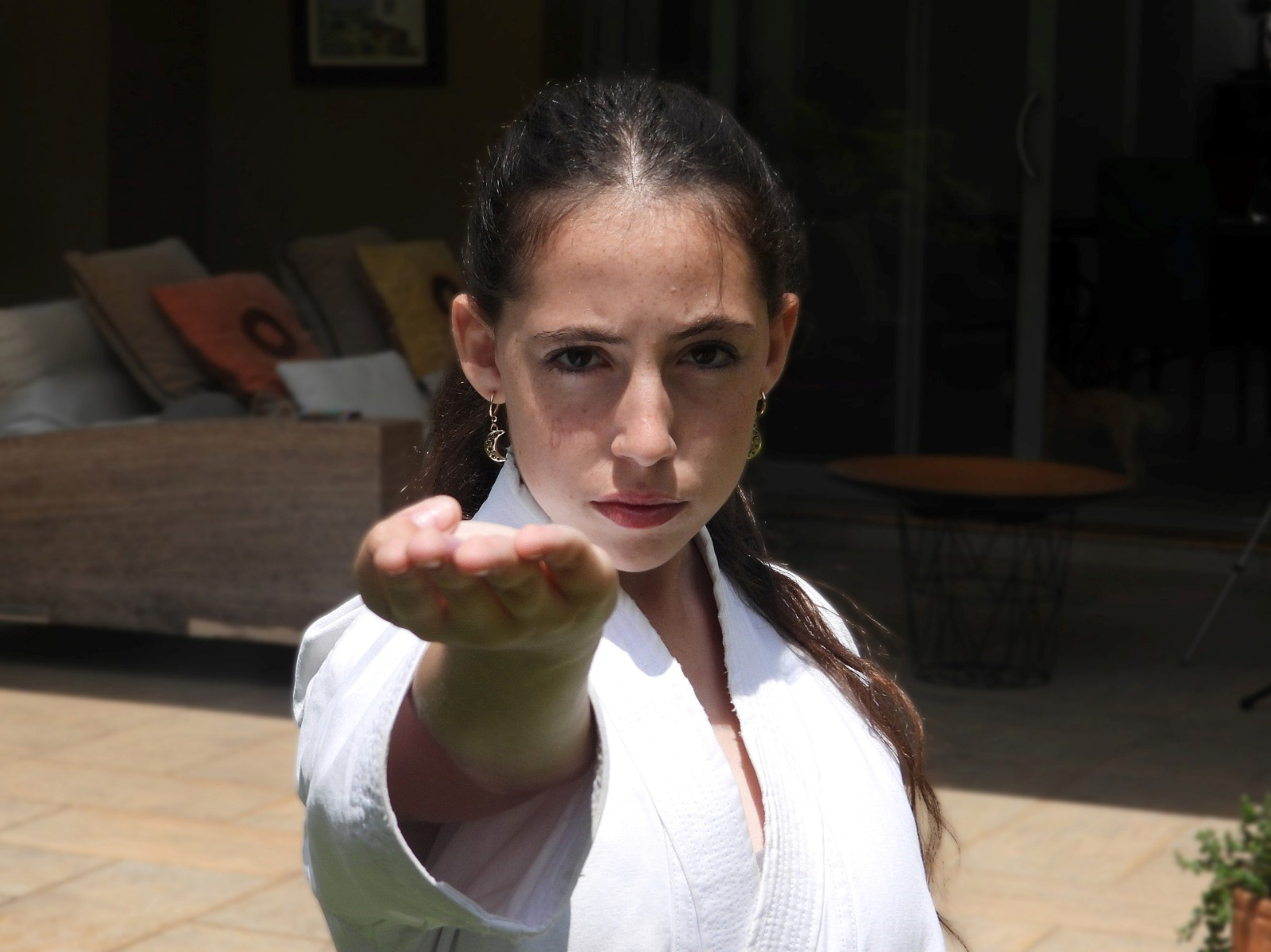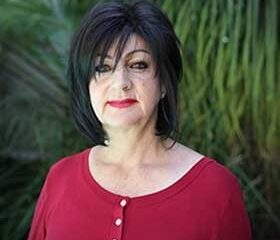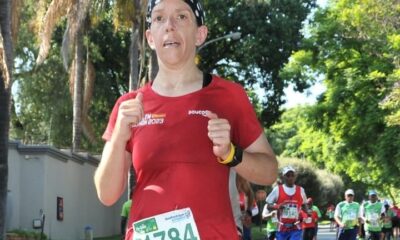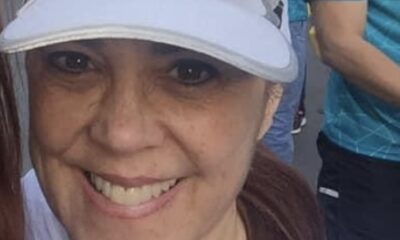
Featured Item

Beating cancer created a calling to help others live
Published
1 year agoon
“I wouldn’t be who I am if I hadn’t beat cancer,” says Hannah Katz, now a happy, energetic, and healthy 17-year-old King David Linksfield (KDL) scholar.
Instead of leaving her illness behind, she has lent her dynamism to helping to develop projects for DL Link, a Jewish organisation that helps cancer patients, and working in KDL’s outreach programme.
“I want to do my best to improve other people’s lives. After returning from the United States [US], where I received support from my family and all kinds of people [during treatment], I have found that bringing light and love to people who are sick makes me feel good. I have a purpose,” she says.
Katz, who is in Grade 11, has made a full recovery since being diagnosed with embryonal rhabdomyosarcoma cancer at the age of 11. This is a rare type of cancer that occurs mostly in children.
Treated in Memphis, Tennessee, she says, “I feel differently about my health now, on all sorts of levels. Ever since I came back, I’ve done speeches for DL Link and promoted fundraising. I’m now coming up with my own stuff to do with it.”
DL Link offers lifestyle support for patients with cancer, providing hands-on assistance, emotional care, and concierge services.
This Friday, 17 March, is the Jerusalem Marathon, which DL Link uses to raise funds for Jewish cancer survivors by getting people to participate in the name of someone with cancer, raising donations and runner sponsorships. DL Link hopes to raise R200 000 through the marathon this year.
Katz’s parents, Hayley and Julian, will participate in the marathon, “walking as much of it as they can. My parents were really cool about this. It was something they just wanted to do,” she says.
“It’s an amazing opportunity to send a powerful message and show everybody that we’re still with them,” Katz says. For this young cancer survivor, the Jerusalem Marathon makes her feel more fulfilled spiritually, something which has become so important to her. “Each time a runner completes four steps, they will have done a mitzvah,” she says.
Katz is also excited about another DL Link project she is working on, which is changing the way people see the cancer ribbon. “We’re turning the ribbon around. A ‘V’ on top will now stand for victory, and will recognise survivors. A teardrop below will remember those who we have lost,” she says.
The ribbons will be sold at schools and other organisations for R18 each, which she says is a symbolic number because it represents chai (life).
Katz also spends time volunteering at a crèche on behalf of KDL. She has helped Cupcakes of Hope, Kids Kicking Cancer, Woodrock Animal Rescue, and other charities.
When she isn’t in class or working on charity projects, she’s wearing her karate black belt and training or teaching other kids the martial art.
Katz is a 1st Dan in karate, having been practising karate almost daily since she was four years old.
“Karate is a part of me. It’s something I couldn’t lose even when I was going through my treatment in the US. I went to competitions in the US. It was like from bed to karate and back to bed. It was amazing working on my passion in America. This is where they make the show Cobra Kai, of which I’m a huge fan,” she says.
Her love for karate hasn’t waned. “I like to teach with my sensei and attend competitions. It’s the sport I do after school and then I do my homework. What karate teaches about discipline is really powerful. It’s a part of my recovery, and helped maintain my physical health. I’m a teenage girl, and I have my ups and downs, and karate helps me manage this too,” she says.
Katz’s approach to life is to do her best at everything, and she has managed to catch up on all her school work, having missed a year at KDL while undergoing treatment.
“We had tutors at St Jude Hospital in Memphis where I got treatment. I learned there about how recovery must be a holistic thing. To get better, you must heal in each part of your life. When I got sick, I learned I had cancer, but I learned that I needed to improve other parts of my life too,” Katz says.
She plans to do an undergraduate degree in South Africa, and then go to Cambridge in England. “I used to want to be a doctor, but I’m tired of hospitals,” she says. So, she’s decided she wants to be a quantum physicist.
“I want to do something which helps doctors and medical people. I can research and help people help those who have cancer and other diseases. This could involve developing machines to treat cancers better by fighting tiny parts of the disease.”
Having recovered from cancer is a “hard-to-describe feeling”, she says. “I’m thankful every day that I got through so much, and couldn’t have done it without my support structures.”
Katz’s successful cancer treatment was made possible by her family and the likes of DL Link. Her type of cancer can be aggressive, but most cases respond well to intensive treatment. In her case, though radiation therapy was available in South Africa, there was highly effective specialised treatment in Memphis which would lessen the risk of side effects on her small and developing body. Had she stayed at home for treatment, traditional radiation therapy could have led to the impairment of her cognitive abilities.
Her parents packed up their lives and moved to a city where Katz had access to Pencil Beam Proton Radiotherapy, a technology which focusses the radiation precisely, so that her illness could be treated with the minimum risk of side effects. This therapy had a lower risk of damaging her body.
Only three cities in the world offered the treatment, one of which was in Memphis. It caused a huge upheaval for the Katz family. Her brother, Jonah, who had just turned nine, had to be home-schooled.
“I don’t think I really understood how sick I was. What I’ve been through might be unusual and scary, but I think I’ve been incredibly lucky,” she says.
“The things that we go through shape us, and I’m now at a stage where I can put energy into giving. I don’t want to be seen just as a kid who survived an illness, but as someone who is making a difference. It takes a village to do good things, and I had a lot of help.
“Whenever something doesn’t go right, I always think to myself, ‘Hashem must have a reason.’ This helps me deal with my challenges. I just put all my faith and my heart there, and then I know things will be okay,” she says.
Katz believes she is who she is because she experienced intricate and focused care, and she hopes these can be brought back to South Africa.
“My disease was a wake-up call to change my life. You don’t just push buttons, and you’re better,” she says. “To heal from these diseases, you have to change your lifestyle. Everything must heal – your soul, your body, your mind, and your heart.”










